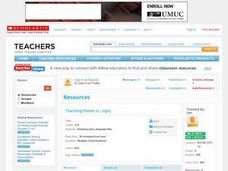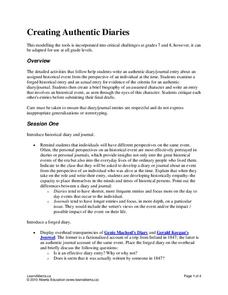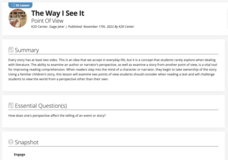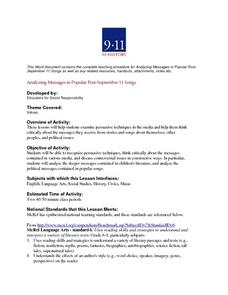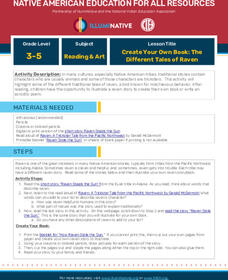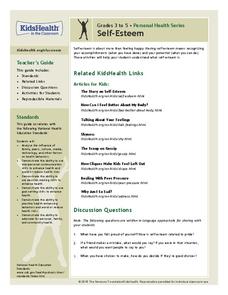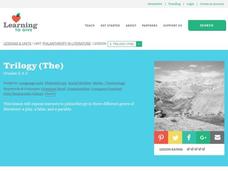Overcoming Obstacles
Cooperation and Teamwork
One of Aesop's fables begins with a activity about cooperation and teamwork. Scholars listen carefully, taking note of the moral of the story. The class discusses their findings and why working with others makes work easier. Learners...
Pearson
Catching the Sun: Tales from Asia
Explore the folklore of Asia and the South Pacific with this language arts instructional activity series. Complementing a reading of Catching the Sun: Tales from Asia by Jan M. Mike, this resource supports learners with understanding...
Curated OER
And the Moral Is...
Students complete a unit using Aesop's fables to learn about morals and insert them into their everyday lives. In this moral values lesson, students complete four lessons using various Aesop's fables.
Curated OER
Theme vs. Topic
Students use Aesop's fables to examine theme and topic. For this theme and topic lesson, students read different fables and discussing as a class. After hearing more stories students work in pairs to determine the theme or topic.
Curated OER
The Boy Who Cried Wolf!
Young scholars use fables to learn about trustworthiness and character education. In this trust lesson, students discuss the fable of the boy who cried 'Wolf' and discuss the importance of telling the truth. Young scholars answer the...
Curated OER
The Empty Pot: A Lesson About Integrity
Learners discuss whether honesty really is the best policy with a lesson on "The Empty Pot," a Chinese fable about integrity. After reading the story, class members answer several comprehension and reflection questions about what they...
Alberta Learning
Creating Authentic Diaries
Napoleon Bonaparte once said, "What is history but a fable agreed upon?" A series of lessons encourages learners to look beyond the basic fable agreed upon related to events in history and consider multiple accounts of the event. The...
Savvas Learning
Verbs: Future
As part of their study of future tense verbs, language learners engage in activities, read fables, and sing songs. The 25-page packet includes detailed lessons, worksheets, graphic organizers, and answer keys for assessments.
Curated OER
Lesson: All in a Name
Lao Tzu was the fabled author of the Toa te Ching, Lau Tzu is also the name of a large sculptural piece. Kids examine Mark di Suvero's larger-than-life sculptures in relation to the elements of art they've learner about. They examine...
Overcoming Obstacles
Being Responsible
Responsible-decision making is the focus of the social-emotional learning lessons. After reading, The Ant and the Grasshopper: An Aesop Fable, scholars come up with six steps to take responsibility for their actions and then practice the...
K20 LEARN
The Way I See It: Point of View
Robbers see a house from a different perspective than real estate agents. That's the big idea in a lesson about point of view. Groups assume the role of either robbers or real estate agents, note important details in a description of a...
Curated OER
911 As History
Learners recognize persuasive techniques, think criticaly about the messages contained in various media, and discuss controversial issues in constructive ways. They analyze the deeper messages contained in children's literature, and...
Curated OER
The New Explorers: Miracle Dolphin
Students view "Miracle Dolphin" which tells the fascinating story of a fable that came true and explores both the story and the science of Holly's life among the Bedouins of Nuweiba El Muzena.
Curated OER
What is a Philanthropist?
What does a philanthropist do? Help your class explore philanthropy using character development and literacy ideas. Learners will define and give examples of philanthropy, listen to The Lion and the Mouse, discuss how the characters help...
Penguin Books
A Teacher's Guide to the Signet Classic Edition of George Orwell's Animal Farm
Not all teacher's guides are equal, but some are pretty good. This guide for George Orwell's Animal Farm includes chapter synopses, chapter-by-chapter discussion questions, journal and essay prompts, and suggestions for various activities.
Curated OER
Create Your Own Book: The Different Tales of Raven
The raven is the focus of a lesson that examines trickster tales and the different stories about the bird. After listening to three tales about the raven, scholars pinpoint and discuss descriptive words. Pupils use one story to...
Curated OER
Self-Esteem
Young scholars determine what contributes to their self-esteem. In this self-esteem lesson, students participate in a discussion by answering a list of questions. They complete two handouts; one entitled "Who's in the Mirror?" and...
Curated OER
Philanthropy in Literature
Learners research philanthropy in three genres: a play, a fable, and a parable. Students read an Aesop fable and answer questions in groups. Learners complete steps in two worksheets from 'The Good San Franciscan' and 'Someone Should.'...
Curated OER
We Are Unique - Yet Also Alike
Sixth graders compare their lives to trees and make connections between the two, consider how trees are metaphors for people, and draw and label trees to represent themselves. Students then read brief stories, fables or nursery rhymes,...
Curated OER
Proverbs
Fifth graders listen to a fable that ends with a proverb. They infer the meaning of the proverb. Students examine proverbs and predict meaning. They write a skit that shows the appropriate usage of the proverb.
Curated OER
Determining Author's Point of View: The Sneeches
Determine the author's point of view in a text. Young readers read Dr. Seuss' The Sneeches and identify the author's purpose in the story. They identify persuasive techniques in writing, asking and answering questions to better...
Polar Trec
Talk Story: A Native Way of Knowing
The steps of the scientific method examine a problem, make a prediction, and attempt to solve the problem—similar to the path most stories take. In the activity, individuals see how stories can explain natural events similar to the way...
Curated OER
I Hate to Complain but your Cheese Stinks
Students read and discuss the "fractured" fairy tale "The Stinky Cheese Man". They imagine that they are in the fairy tale and write a letter of complaint concerning the Cheese Man and how he stinks up the town.
Curated OER
Small Actions with Big Results
Students explore philanthropy in literature. In this literature lesson, students read text from three different genres that all have a moral. Students compare and contrast these pieces of literature, focusing on the character traits that...
Other popular searches
- Writing Fables
- Morals Fables
- Aesop's Fables
- Characteristics of Fables
- Fables and Fairy Tales
- Aesops Fables
- Myths Fables
- Aesop Fables
- Lesson Plans on Fables
- Fables and Myths
- Writing Fables and Folktales
- Writing Fables Middle School





